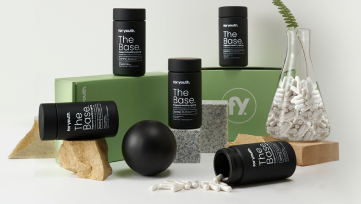What are zombie cells?

Inspired by the undead
Zombie cells, also known as senescent cells, are cells that have stopped dividing and are no longer able to perform their normal functions. Zombie cells are a normal part of the ageing process and can accumulate in the body over time, leading to a number of issues.
Normally, cells have a built-in mechanism called apoptosis that triggers cell death when a cell becomes damaged or reaches the end of its lifespan. However, zombie cells have a way of evading apoptosis and continue to survive. Dead… but still alive. As senescent cells reminded scientists of this mythical undead creature, they are most commonly referred to as zombie cells. These zombie cells continue to release chemical signals that can cause inflammation, disrupt tissue repair, and interfere with the normal functioning of the immune system.
By signing up, you consent to receive For Youth emails
Get The Latest On Longevity Delivered To Your Inbox.
Zombie cells cause inflammation
One major problem with zombie cells is that they can cause chronic inflammation, which is linked to a variety of age-related diseases, including cancer, heart disease, and Alzheimer’s. They also release a variety of chemical signals that can cause nearby healthy cells to become senescent as well.
Another problem with senescent cells is that they can interfere with the normal process of tissue repair, making it harder for the body to recover from injury or disease. They can also disrupt the normal functioning of the immune system, making it less able to fight off infections and other health problems.

The Zombie – Quercetin
Combatting zombie cells with an absorption rate which is 20x higher than other types of quercetin.
Enter quercetin
Luckily, there are ways to help get rid of zombie cells. One promising approach is the use of natural compounds like quercetin, a flavonoid found in fruits and vegetables such as apples, berries, and onions.
Quercetin has been shown to have anti-inflammatory and anti-cancer properties, and it’s also been found to help get rid of senescent cells. Although scientists don’t exactly know why, but they did find that quercetin can trigger the process of apoptosis, which causes zombie cells to self-destruct.
For Youth’s quercetin is different from standard types of quercetin. The Zombie – Quercetin contains quercetin phytosome, an original formulation by Italian manufacturer Indena. In this formulation, quercetin extract is wrapped in a little sphere of fat for an absorption rate that is twenty times higher than unformulated quercetin. This make The Zombie – Quercetin much more effective than any other quercetin supplement on the market.
FAQ:
What are Zombie Cells?
What exactly are zombie cells?
Zombie cells, scientifically known as senescent cells, are cells that have stopped dividing but do not die. They accumulate in various tissues of the body as one age and can contribute to chronic inflammation, aging-related diseases, and impair the function of healthy cells nearby.
How do zombie cells affect the body?
The accumulation of zombie cells in the body can promote inflammation, tissue damage, and dysfunction, leading to a wide array of aging-related diseases such as arthritis, diabetes, and heart disease. They can also contribute to the aging process itself, affecting skin elasticity, organ function, and overall health.
Can zombie cells be removed or targeted?
Yes, researchers are exploring therapies known as senolytics which can selectively remove or neutralize senescent cells. By targeting these cells, it is hoped that the negative effects associated with aging and chronic diseases can be mitigated.
What is Quercetin?
Quercetin is a plant pigment (flavonoid) that is found in many fruits, vegetables, leaves, and grains. It possesses antioxidant and anti-inflammatory effects that might help reduce swelling, kill cancer cells, control blood sugar, and help prevent heart disease.
How is Quercetin linked to zombie cells?
Quercetin has been identified as a potential senolytic agent, which means it might help in targeting and eliminating senescent (zombie) cells from the body. Studies in animals have shown that it can reduce the number of senescent cells, improving health and potentially extending lifespan.
Can taking Quercetin supplements be beneficial for health?
While research suggests that Quercetin can have multiple health benefits, including potential anti-aging effects, it is important to be cautious. The exact dosages, long-term effects, and efficacy of Quercetin supplements in humans still require further research. Always consult a healthcare provider before starting any new supplement regimen.
Are there any side effects associated with Quercetin?
Quercetin is generally considered safe when consumed in food. However, taking high doses of Quercetin in supplement form may lead to side effects such as headaches and tingling in the arms and legs. High doses might also interact with certain medications, so it’s important to consult a healthcare provider before supplementation.








